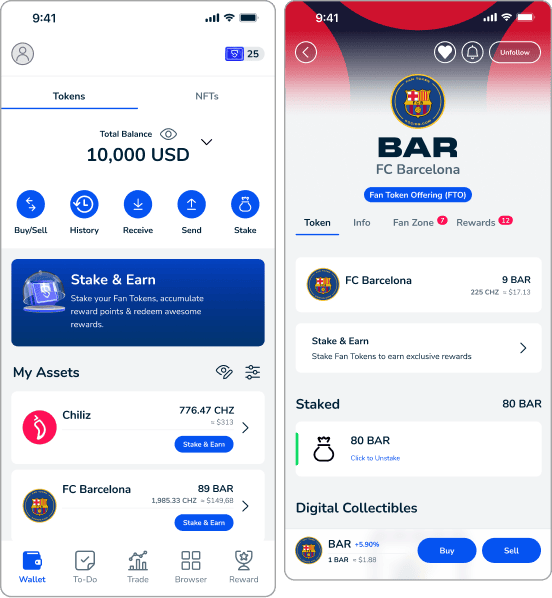Over recent years, social media has changed the game for football fans. There is more content than ever to keep fans entertained, but more recently, we’ve seen a new form of interaction emerge, which is placing fans (and their opinions) at the epicentre of the game.
A study conducted by Facebook after last year’s World Cup, cited that there were 400 million football fans on Facebook alone, and a further 140 million on Instagram. Eleven million stories were produced on Instagram as fans around the world shared their favourite moments of the tournament online.
According to a Nielsen study of football fans*, 51% of 16–34 year olds now use Facebook to consume all types of football content, and COPA90’s recent Modern Fan report highlights the importance of meme culture amongst football fans, with funny videos and memes now overtaking game highlights on social media (60% v 59%). Interviews, GIFs and statistics make up the rest of the top five content forms.Over on Instagram, we have witnessed a meteoric rise in the popularity of individual players. Facebook’s study claims that 94% of sports fans use the platform to see the personal side of athletes. Ronaldo (158m), Neymar (112m) and Messi (111m) have the greatest number of followers (more than outshining their respective clubs), proving that some players are far bigger than the clubs themselves. Juventus’ Instagram grew by 4.7 million when Ronaldo signed; conversely, Real Madrid lost a million fans over the same period.
While the social footprint of star players is becoming increasingly important for clubs during the transfer window, it is perhaps more interesting to see how these individual players are using their personal social media profiles to increase fan engagement, not only for themselves but for their teams.
Mario Balotelli went rogue with his latest goal celebration ? pic.twitter.com/nv5TIP2RNe
— BBC Sport (@BBCSport) March 4, 2019
Mario Balotelli of Olympique de Marseille made history earlier this month when he became the first player to broadcast his goal celebration live on Instagram.
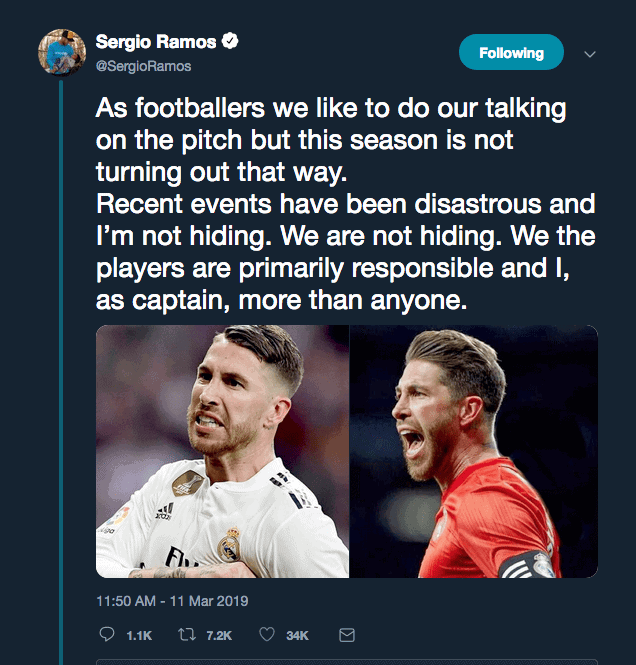
Earlier this week, Sergio Ramos, Team Captain for Real Madrid, used Twitter to explain to his 16 million followers why his team were not performing. He was also quick to point out that it was the fans who made the club and their success was not down to one man.
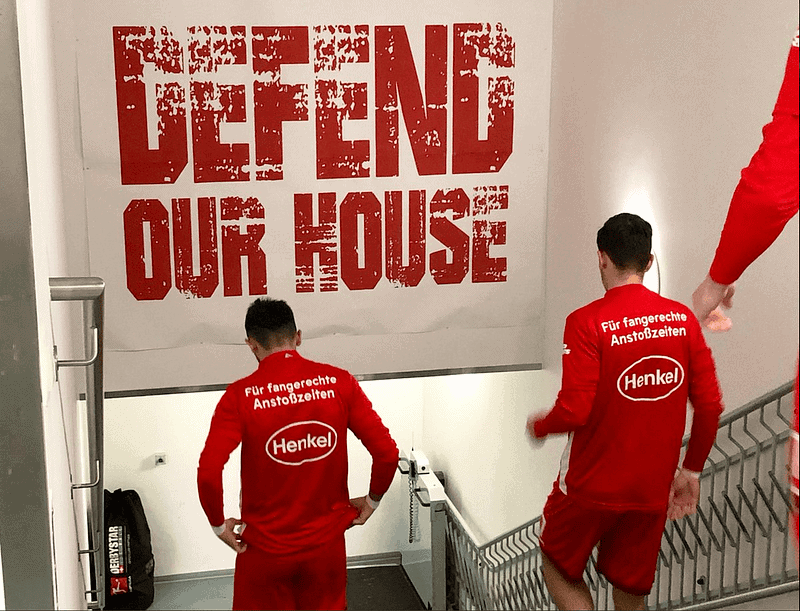
In another example, Fortuna Düsseldorf players in a match against Eintracht Frankfurt, showed their fans public support in their ongoing protests against Bundesliga games being played on Monday’s by warming up in special shirts that read “Pro fan-friendly kick-off times”.
Besides these player-led interactions, clubs like Paris Saint-Germain have also been keen to open up to fans, even inviting them to a training session following their knockout at the hands of Manchester United in the Champions League.
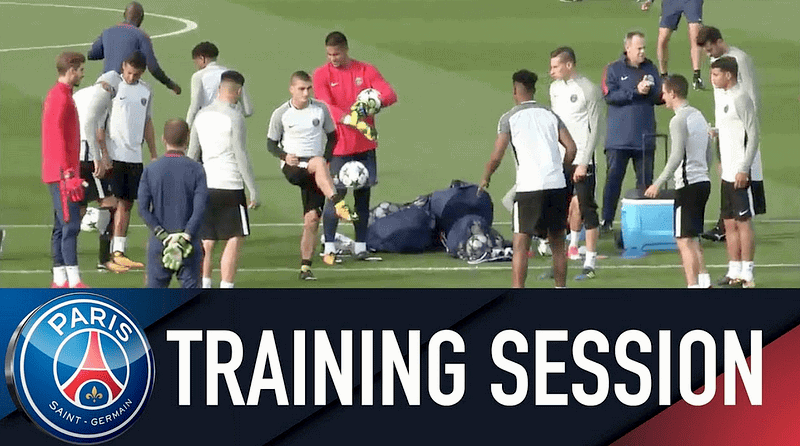
We are still a long way from Arsene Wenger’s prediction way back in the 2000s that a day would come when a club’s line-up would be selected by public vote — sentiments that made headlines again last year, when he stated that substitutions would eventually be decided on social media — but we are surely edging ever closer.
The need for clubs to increase fan engagement and listen to / act on fan opinion is very clear. According to COPA90, fan influence is set to transform fan engagement across the sports industry in the coming years — “it won’t be long before fans have the power to dictate player celebrations or decide on substitutions, as new ways to influence and interact directly with the action on the pitch emerge.” Indeed, according to the Nielsen research, two thirds of football fans across the globe are interested in voting to influence decision-making at their clubs, equating to 46m fans in Brazil, 13m fans in Germany, 16.6m in Italy, 2.4m in Portugal, 13m in Spain and 11.3 in the United Kingdom. The same study found that over half of football fans (55%) worldwide would be interested in purchasing tokens that gave them the right to vote on decisions at their favourite club, paying on average 10 EUR / 11 USD for the privilege.
This week, CoinMarketCap ran a Twitter poll to gauge what percentage of their crypto audience would be interested in buying, trading or using — a utility token issued by some of the biggest brand names in the sporting world. They received over 1700 votes, with 47% of respondents stating that they would be likely or very likely to buy a token.
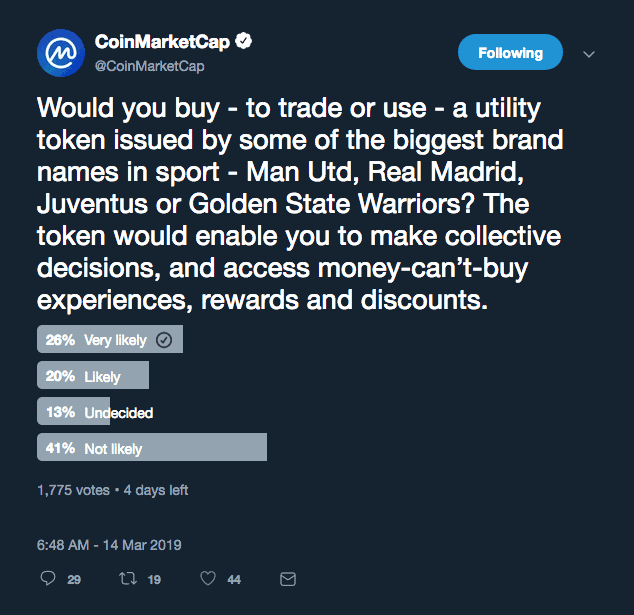
Through Socios.com, football fans now have a real chance to have a meaningful say in club-related decisions. Through polls on the mobile app, football fans can participate in collective decision-making through binding and non-binding polls posted by the clubs themselves. The ball is really in the clubs’ court when it comes to the level of engagement they leverage but whichever path they decide to take enhanced digital fan engagement cannot be ignored.
*Socios.com commissioned Nielsen Sports to undertake a study of 2,793 football fans from Brazil, Italy, Spain, Portugal, Germany and the UK.



